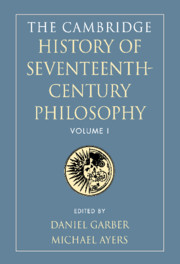Book contents
- Frontmatter
- Introduction
- I The context of seventeenth-century philosophy
- II Logic, language, and abstract objects
- 4 Logic in the seventeenth century preliminary remarks and the constituents of the proposition
- 5 Proposition and judgement
- 6 Deductive reasoning
- 7 Method and the study of nature
- 8 Universals, essences, and abstract entities
- 9 Individuation
- III God
- IV Body and the physical world
- V Spirit
- Bibliographical appendix
- Bibliography
6 - Deductive reasoning
from II - Logic, language, and abstract objects
Published online by Cambridge University Press: 28 March 2008
- Frontmatter
- Introduction
- I The context of seventeenth-century philosophy
- II Logic, language, and abstract objects
- 4 Logic in the seventeenth century preliminary remarks and the constituents of the proposition
- 5 Proposition and judgement
- 6 Deductive reasoning
- 7 Method and the study of nature
- 8 Universals, essences, and abstract entities
- 9 Individuation
- III God
- IV Body and the physical world
- V Spirit
- Bibliographical appendix
- Bibliography
Summary
CONTRA AND PRO THE SYLLOGISM
Most seventeenth–century textbooks of logic follow the usual pattern according to which a discussion of the constituents of propositions and of propositions themselves leads up to a part dealing with those combinations of propositions which exhibit a valid form of deductive argument. From Aristotle onward the core of this part of logic had been the doctrine of the syllogism. Already during the period of the Renaissance, however, the privileged position of the syllogism had been vehemently attacked by those humanist dialecticians who wanted to restrain the influence of Aristotelianism on their subject. Their criticisms were taken over and elaborated by such modern thinkers as Francis Bacon, Descartes, and Locke.
Bacon bases his disapproval of the use of syllogisms in natural science on the consideration that, if the notions which are signified by the words making up their constituent propositions are improperly and overhastily abstracted from facts, the whole edifice tumbles. Though he admits that the syllogism may be an acceptable instrument of reasoning in such fields as divinity, ethics, politics, and the law, in dealing with the nature of things he wants to use induction throughout. In the same vein, Descartes contends that traditional dialectic is quite useless to those who are seeking truth and that at best it can serve to expound more easily to others things that one already knows; rather than to philosophy, it belongs to rhetoric. Moreover, it is, he says, an illusion to think that the truth about any question can be reached by the mechanical application of the formal rules ofsyllogistic inference.
- Type
- Chapter
- Information
- The Cambridge History of Seventeenth-Century Philosophy , pp. 132 - 146Publisher: Cambridge University PressPrint publication year: 2000
- 2
- Cited by

